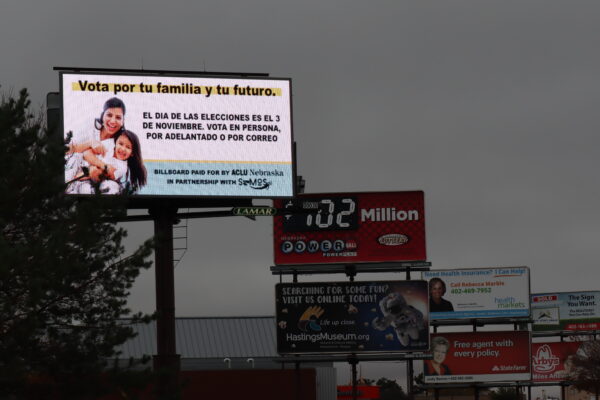LINCOLN, Neb. – With less than a week before Election Day, the ACLU of Nebraska is encouraging Spanish-speaking voters to know their rights and to vote.
ACLU voting rights information is now available online in Spanish: https://www.aclu.org/other/conozca-sus-derechos-derecho-al-voto
The new resource comes with new outreach in Nebraska.
ACLU billboards are currently on display in Grand Island and Hastings in partnership with SOMOSgi. A radio ad is running on LOBO 97.7. The ACLU has also paid for bilingual live phone calls as part of its campaign to increase voter turnout.
Rose Godinez, ACLU of Nebraska legal and policy counsel, said the goal of the project is to remove barriers to participation for eligible voters; provide voter education about the process to remove barriers to participation due to language barriers and a lack of historical targeted outreach; and to encourage Spanish speaking eligible voters in Nebraska into the process while there is still time.
“Spanish is my first language and I am proud to be bilingual, so this issue is really important to me and my family,” Godinez said. “Difficulty with speaking English should not keep Nebraskans from accessing the polls and from exercising their right to vote. Who we vote for as our representatives in national and local races and their decisions affect our families, our communities and our future. Every eligible voter should use their fundamental right to vote.”
ACLU of Nebraska board member Yolanda Nuncio helped bring the campaign to Grand Island. Roughly a third of the city’s population identifies as Hispanic or Latinx.
“The message on our billboards is simple: be a voter for your family and their future,” Nuncio said. “I know as a former principal and lifelong educator that voting helps ensure the needs of our families and our community are met by our leaders. That’s why it’s so important that every eligible voter participates.”
Currently, only Colfax, Dakota and Dawson Counties are required to provide bilingual voting materials because more than 5% of their total voting age population speak Spanish.
By federal law, all voters who have difficulty reading or writing in English have the right to receive in-person help at the polls by a person of their choice. This helper cannot be the voter’s employer, an agent of the voter’s employer, or an agent or officer of the voter’s union. The helper must respect the voter’s privacy, not looking at the voter’s ballot unless the voter asks them to do so.
Stay Informed
Sign up to be the first to hear about how to take action.
By completing this form, I agree to receive occasional emails per the terms of the ACLU’s privacy statement.
By completing this form, I agree to receive occasional emails per the terms of the ACLU’s privacy statement.

